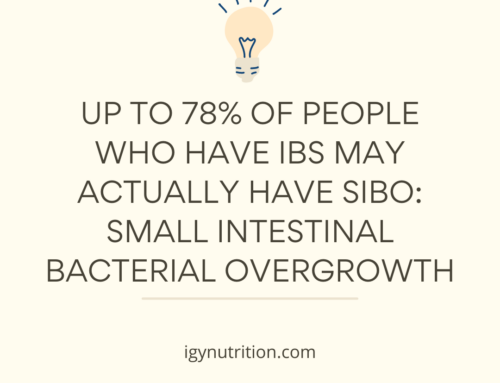From inflammation to mood swings, gut bacteria imbalances can impact our overall health in a myriad of ways. We learned that there are 2 main kinds of bacteria in our gut: Firmicutes, which are the bad kind, and Bacteroidetes, which are the good bacteria. The ultimate goal for a healthy gut is to have a high diversity in gut bacteria; and having more of the good kind over the bad. So how do we increase the number of good bacteria and lower the amount of harmful ones? Here are 10 tips to improve your gut bacteria:
- Be careful with antibiotics
Antibiotics are sometimes a necessity, and we are not telling you to never use them; but nowadays doctors tend to give antibiotics for anything and everything, and it isn’t always the best solution. Antibiotics wipe out the bad bacteria, which is how they help your recover, but they wipe out all your good bacteria as well. This is dangerous, because you are stripped of the beneficial bacteria in your gut that helps you stay healthy. If you do have to take antibiotics, be sure to complement with probiotics afterwards, to re-introduce good bacteria in your gut.
- Lower the amount of fatty foods in your diet
We know that foods high in fat increase the amount of bad bacteria, the firmicutes; and an overgrowth of firmicutes is linked to obesity and inflammation; which then can turn in more serious health problems such as diabetes and heart issues. Studies have demonstrated that fat in the diet inhibits the growth of healthy bacteria. The problem with fatty foods such as carbohydrates is they are digested very easily and absorbed into our small intestine without any help from the microbes. The gut bacteria needs to “eat”, and without anything to digest they end up eating the mucus lining of our intestines — which is meant to be a strong barrier between the gut and the rest of the body. When the wall of the intestine is permeated, particles of food enter the bloodstream, and our immune system alerts our brain and other organs to the attack, causing inflammation in various parts of our body. Inflammation is the root of a lot of health problems. Sugar also feeds organisms like Candida Albican, a kind of fungus that grows in the gut and attacks the intestine wall.
You should try to keep fatty and processed foods to a minimum in your diet to keep your gut healthy.
- Consume less meat
Research has found that having a high amount of meat in your diet changes your microbial composition. In those diets, the microbiome produced more of the bacteria Bilophila, which has been found to cause inflammation and intestinal diseases. Animal protein from meat, eggs, and dairy products are metabolized in the gut and release a substance (trimethylamine-N-oxide), which has been linked to cardiovascular disease. Meat should be eaten in moderation to stay healthy.
- Eat more vegetables and fiber
On the contrary, fiber (which is found in oatmeal, lentils, beans, and fruit) ferments in the colon and feeds the bacteria that live there, which keeps them happy and may improve their ability to prevent weight gain. Eating more dietary fiber will keep our intestinal lining intact,and also help us sustain a more varied collection of bacteria, which is paramount to good health.
Eating vegetables also help with microbial diversity – especially dark leafy greens, which feed the beneficial bacteria and secrete bactericides that kill off harmful bacteria.
- Try fermented foods
Fermented foods, such as Kimchi, Sauerkraut, Yogurt, Kefir and Kombucha teas, are great sources of beneficial bacteria. You have to make sure that it says “live cultures” on the labels. Those foods are natural sources of probiotics, and they will help increase the diversity of your microbiome.
- Take probiotics
One fast and easy way to change your microbiome is to take probiotics supplements. Probiotics are beneficial bacteria, such as Lactobacillus, Bacteroides fragilis or Bifidobacterium. Always look at the CFUs and specific strains of bacteria listed on the bottle. Probiotics are measured in colony forming units (CFUs). While there’s not currently a recommended daily value to follow, a supplement with 5 billion CFUs per pill is usually a dose that works well. Not all probiotics contain the same bacteria, so it’s possible to select a specific formulation depending on what you’d like to treat. When looking for a probiotic, choose one that has at least three varied types of bacteria.
- And eat prebiotics
Prebiotics are sort of the “food” for probiotics. They are un-digestible plant fibers that already live inside the large intestine. The more food, or prebiotics, that probiotics have to eat, the more efficiently these live bacteria work and the healthier your gut will be. There are many foods that contain prebiotics, such as raw artichoke, asparagus, onions, garlic and leeks, and bananas.
The more of those foods you eat, the more probiotics will flourish, and your overall gut health will improve.
- Stop stressing!
Research has found that exposure to stress led to an overgrowth of certain harmful types of bacteria while simultaneously reducing microbial diversity in the large intestine. When you feel stressed, your body will discharge natural steroids and adrenaline, and your immune system will release inflammatory cytokines. If you tend to be stressed all the time, your immune response never stops sending inflammation messages to all parts of your body — your gut bugs included. The microbiome helps keep our immune system in check. But too much inflammation causes an array of health problems. Our gut is vulnerable to stress, so to heal it, we have to learn how to relax, with meditation for example, or any other hobby that helps us unwind.
- Exercise more
Aerobic exercise induces changes in the microbiome as well. Research has found that athletes’ microbiomes are much more diverse than normal people. Another finding was a significant increase in the number of the bacteria Lactobacillus, Bifidobacterium and B. coccoides–E. rectale was discovered in groups of people who exercise compared to ones that don’t.
Exercising helps increasing the good kind of bacteria in our gut, so get a workout once in awhile for optimal gut health!
- Get plenty of sleep
A healthy sleep cycle helps the body produce the hormones melatonin and prolactin, which have been found to improve the bacteria balance and help with digestion. Moreover, Dr. Perlmutter, in his book Brain Maker, explains that “ when cortisol levels go up in the morning, the gut bacteria inhibit production of cytokines, and this shift defines the transition between non-REM and REM sleep. Hence, disruption of the gut bacteria can have significant negative effects on sleep and circadian rhythms.” Insomnia and other sleeping problems negatively impact your microbiome.
By getting as close to 8 hours of sleep as you can, you will help balance your gut.




